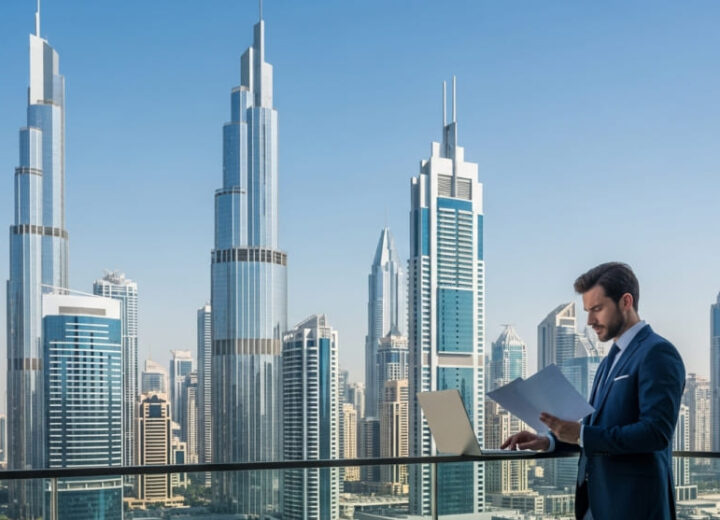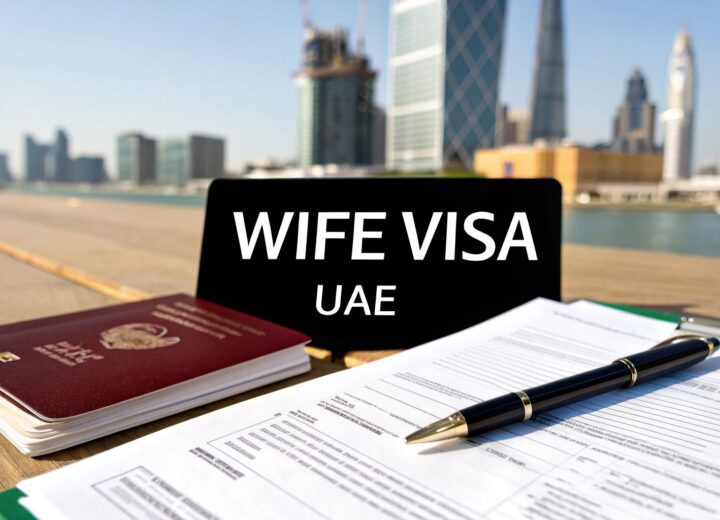Ask anyone about the real business setup cost in Dubai, and you'll find there’s no simple, one-size-fits-all answer. While the typical range falls somewhere between AED 20,000 and over AED 50,000, your final invoice is shaped by the big decisions you make upfront.
Choosing between a Mainland or Free Zone setup, defining your specific business activity, and figuring out how many visas you'll need are all critical choices that directly impact your budget.
What Is the Real Cost to Start a Dubai Business?
Thinking about the cost to start a business in Dubai is a bit like planning a trip. There isn't one fixed price for a holiday; it all depends on your destination, the airline you choose, and the hotel you book. Similarly, your business's destination—whether it's the bustling local market on the Mainland or a specialised Free Zone—will completely change your financial plan.
The truth is, calculating the business setup cost in Dubai goes way beyond just the licence fee. It’s a mix of one-time registration charges and recurring annual expenses that you need to be aware of from the start. This guide is your financial roadmap, breaking down every cost component so you can build a realistic budget without any nasty surprises.
As you map out your initial spending, it's also a smart move to look into resources specifically designed for startups and SMBs to see where you can find efficiencies and save money early on.
Key Factors That Influence Your Total Investment
A few core elements will ultimately decide how much you invest. Getting a handle on these is the first step toward smart financial planning.
- Jurisdiction (Mainland vs. Free Zone): This is probably the single biggest cost driver. A Mainland setup gives you unrestricted access to the entire UAE market, but it often comes with higher initial costs and stricter rules, like needing a physical office. On the other hand, Free Zones offer bundled packages that can be much more budget-friendly, especially for international entrepreneurs.
- Business Activity: What your business does directly affects the type of licence you'll need (commercial, professional, or industrial) and the government fees attached to it. Some activities simply cost more than others.
- Visa Requirements: The number of investor or employee visas you apply for will add up. Each visa comes with its own set of government fees for processing, mandatory medical tests, and the Emirates ID card.
Beyond the Licence Fee
It’s a classic mistake to only focus on the trade licence price tag. A proper budget needs to account for everything else: office space, visa processing, document attestation, and corporate PRO services to handle all the government paperwork. This is exactly where bringing in a specialist becomes a game-changer.
An expert can build a cost-effective setup plan tailored to your exact needs, making sure you can take full advantage of the UAE's tax benefits without getting hit by unexpected costs down the line. For a more detailed look at the numbers, you can check out our comprehensive breakdown of the cost of setting up a business in Dubai.
Partnering with formation specialists is not just about saving money—it’s about investing in peace of mind and a smooth, successful launch. It ensures you have a clear financial picture from the start.
Breaking Down Dubai Mainland Setup Costs
Choosing to set up your business on the Dubai mainland is a bit like opening a shop on the busiest high street in the city. You get direct, unfiltered access to the entire local UAE market—an absolute game-changer for many businesses. But this prime positioning comes with its own unique set of costs, which are quite different from what you'd find in a free zone. Getting a firm grip on this financial commitment is your first real step toward a successful launch.
Unlike the all-in-one packages you often see in free zones, mainland setup costs are more of an itemised affair. Every single step, from reserving your company name to getting that final licence in hand, has its own distinct government fee. While this line-by-line approach is transparent, it means you have to budget carefully to sidestep any nasty surprises down the road.
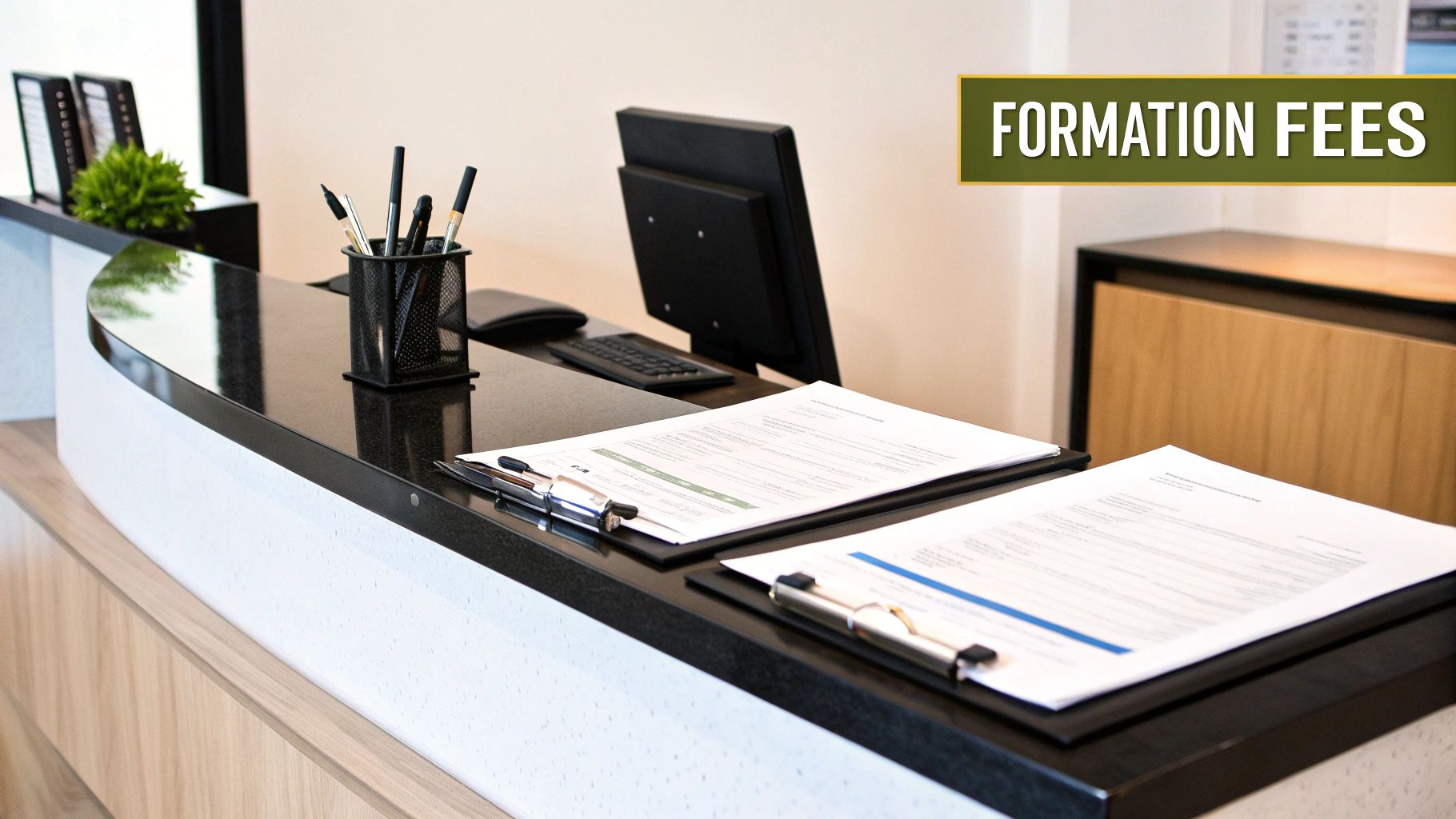
The Foundational Government Fees
Your journey to securing a mainland licence kicks off with several administrative hurdles, and each one has a fee attached. These are the non-negotiable costs set by the Dubai Department of Economic Development (DED) and other official bodies.
Your first major point of contact will be the DED, where you'll need to get initial approval. This is essentially the government confirming they have no objection to your business idea. Right after that, you'll reserve your trade name, which has to be unique and follow the UAE's specific naming rules.
Think of these early steps as laying the legal groundwork for your company's identity.
- Initial Approval: This is the DED's green light to move forward with your application. It's a critical first checkpoint.
- Trade Name Reservation: You must register a one-of-a-kind name for your business. The fees can tick up if you opt for a non-Arabic or foreign-sounding name.
- Memorandum of Association (MOA) Attestation: This is the legal document that spells out your company's structure and ownership. It needs to be professionally drafted and notarised, which comes with its own attestation fees.
These initial government charges form the foundation of your total business setup cost in Dubai.
Demystifying the Trade Licence Cost
The trade licence is, without a doubt, the biggest single one-time cost in your mainland setup. Its price isn't a fixed number; it actually changes depending on the business activity you choose. The DED groups activities into commercial, professional, and industrial licences, and each category has a different fee structure.
A general trading licence, for example, won't cost the same as a licence for a consultancy or an IT services company. To give you a clearer picture, getting your mainland company off the ground involves several distinct costs that you need to factor in. For instance, the DED's initial approval fees are around AED 116 plus another AED 151. Trade name approval will set you back about AED 651 plus AED 116. Drafting and verifying your Memorandum of Association can be around AED 1,200, and registration with the Ministry of Economy is close to AED 3,000. The Dubai mainland business licence itself starts from roughly AED 12,000 annually.
This all means your basic setup costs will typically exceed AED 20,000, and that's before you even think about operational expenses. You can learn more about this comprehensive cost structure to better prepare your budget. Discover more insights about mainland company setup costs on startanybusiness.ae.
To give you a clearer, at-a-glance overview, here’s a table summarising the typical costs involved in a Dubai mainland setup.
Estimated Dubai Mainland Company Setup Costs
This table breaks down the common one-time and annual fees you'll encounter when establishing a business on the Dubai mainland.
| Cost Component | Estimated Cost (AED) | Type (One-Time/Annual) |
|---|---|---|
| DED Initial Approval | 267 | One-Time |
| Trade Name Registration | 767 | One-Time |
| MOA Drafting & Attestation | 1,200 | One-Time |
| Ministry of Economy Registration | 3,000 | One-Time |
| Trade Licence Fee | 12,000+ | Annual |
| Local Service Agent (LSA) Fee | 5,000 – 25,000 | Annual |
| Establishment Card | 600 | One-Time |
| Office Ejari (Rent Registration) | 200+ | Annual |
Remember, these figures are estimates. The final costs can vary based on your specific business activity, the number of partners, and other unique factors.
Navigating these variable costs is where specialist advice becomes indispensable. An expert in mainland company formation can provide a precise quote based on your specific business activity, ensuring your budget is accurate from day one.
Local Sponsorship and Service Agent Fees
In the past, one of the defining features of a mainland setup was the need for a local partner or sponsor. While recent legal reforms now allow 100% foreign ownership for many business activities, certain strategic sectors still require a Local Service Agent (LSA) or a UAE national partner.
If your business activity happens to fall into one of these categories, you'll need to budget for an annual fee for your local partner. It’s important to understand this isn't a share of your profits, but a fixed yearly fee that's agreed upon in your LSA agreement.
- Local Service Agent (LSA): This is required for professional licences (like consultancies) that have 100% foreign ownership. The LSA has no operational control over the business but acts as your official government go-between.
- UAE National Sponsor: For some commercial and industrial activities, a UAE national is required to hold 51% of the company's shares.
The annual fee for an LSA or sponsor can vary quite a bit, typically from AED 5,000 to over AED 25,000. This depends on their level of involvement and the nature of your business. It's a critical recurring cost to build into your financial planning. Our specialists can help you structure these agreements in a way that gives you maximum protection and control over your day-to-day operations.
Understanding Dubai Free Zone Setup Costs
Dubai's free zones have a global reputation, and for good reason. They are essentially specialised business parks, each with its own rulebook, designed to pull in international entrepreneurs with major perks like 100% foreign ownership and huge tax advantages.
But here’s the key difference from a mainland setup: instead of an itemised, à la carte cost structure, free zones usually offer all-in-one packages. This makes them a really popular choice for startups and SMEs who want a predictable, upfront investment.
These packages bundle everything you need—registration, your licence, and sometimes even a basic office space. While this simplifies your initial budget, you absolutely need to know what's inside that package to get a true picture of your total business setup cost in Dubai. Prices swing wildly from one free zone to the next, and it all depends on the tier you choose.
The All-in-One Free Zone Package Model
Think of a free zone package like you would a mobile phone plan. You’ve got your basic plan with just enough data and calls to get by, and then you have the premium, unlimited-everything option. Free zones operate the same way, offering tiered packages for different business needs. It could be for a solo entrepreneur who just needs one visa, or a growing company that needs a handful of visas and a proper office.
The cost gap between a simple 'flexi-desk' package (which gives you access to a shared workspace) and one that includes your own private office can be massive. The trick is to honestly assess what you need right now and in the near future. That’s how you pick the most cost-effective option without burning cash on things you don't require.
This diagram breaks down the main components that make up the total licence and registration cost in a typical free zone.
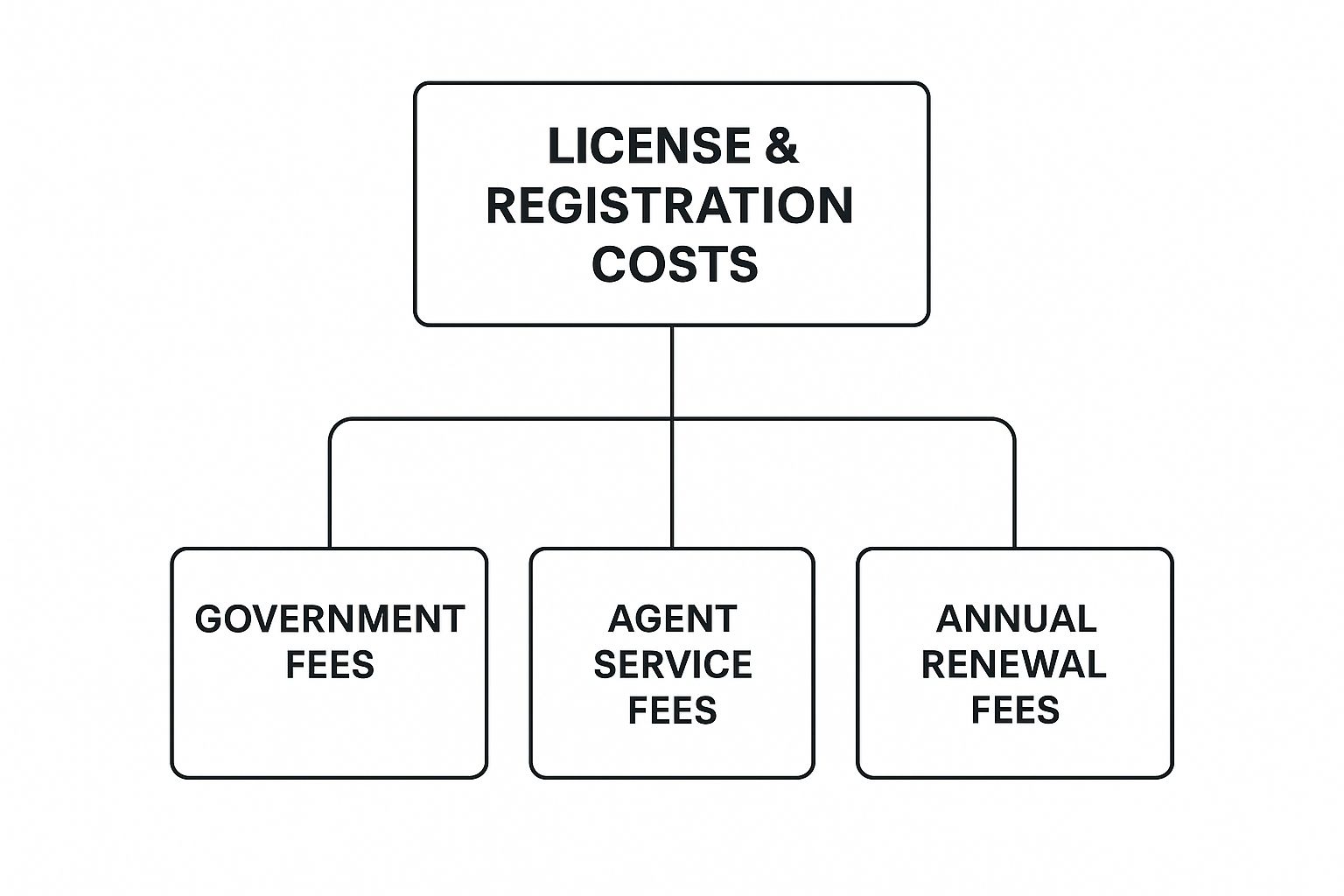
As you can see, your total investment is a mix of government fees, any charges from your service agent, and the annual renewal costs you have to factor into your long-term budget.
A Real-World Example with DMCC
Let's make this tangible. The Dubai Multi Commodities Centre (DMCC) is one of the most popular and well-regarded free zones, and they have a clear cost structure.
First off, the minimum share capital requirement in many Dubai free zones, including DMCC, is typically AED 50,000. We'll touch on what that means in a moment.
DMCC’s packages scale with your business. Their 'Basic Biz Package' for a single shareholder runs AED 35,484 for one year. For a business with bigger ambitions, the 'Jump Start Package' starts at AED 43,780 for a year and can go up to AED 120,000 for a three-year plan.
Key fees to keep in mind are:
- Registration: AED 9,020
- Trade Licence: around AED 20,285 annually
- Establishment Card: AED 1,825 per year
These numbers show that even with bundled packages, the initial outlay is significant.
Understanding the Share Capital Requirement
You'll hear the term "share capital" a lot when looking at free zones. Simply put, it's the amount of money you have to deposit into your new company's bank account after the licence is issued. It’s the free zone’s way of ensuring your company is financially stable and serious.
The share capital isn't a fee you pay to the free zone. It’s your money, and it stays in your company’s bank account. You can use it for business operations as soon as the formation is complete.
The required amount changes from one free zone to another, but AED 50,000 is a very common benchmark. Some zones might not ask you to deposit it right away, but the amount will still be listed in your company's Memorandum of Association (MOA). It's a critical point for financial planning because you must have these funds ready to finalise your setup.
Comparing Free Zones Beyond the Price Tag
While cost is a huge driver, it shouldn't be your only consideration. Each free zone is built for specific industries. Dubai Media City is the hub for media companies, while the Dubai International Financial Centre (DIFC) is purely for finance and banking firms. Picking a zone that actually aligns with your business activity is crucial for success.
When you're comparing your options, think about these factors too:
- Location and Facilities: Is it close to a port, an airport, or your target customers?
- Visa Allocation: Does the package give you enough visas for your team?
- Scalability: What happens when your business grows? Upgrading your package or office space should be a straightforward process.
With over 40 free zones to choose from, navigating the details can feel overwhelming. If you want a clearer picture of which jurisdiction is the right fit, you might find our guide on free zone business setup in Dubai really helpful. By looking at the complete picture—costs, facilities, and strategic fit—you can make a confident decision that sets your business up for the future.
Budgeting For Visas, Office Space and Other Essentials
Getting your trade licence is a massive win, but it’s the starting gun, not the finish line. If you want to build a business that lasts in Dubai, your financial planning has to go way beyond the initial registration fees. The long-term health of your company hinges on accurately budgeting for the costs that keep the lights on and the doors open—things like visas, office space, and essential admin support.
Think of it like buying a car. The licence is the key that starts the engine, but you still need to pay for fuel (office rent), insurance (visas), and regular maintenance (PRO services) to actually drive it anywhere. Skipping these ongoing essentials is a classic mistake that can stall a promising venture before it even gets going. This is where a solid budget for all your recurring expenses becomes your most powerful tool for success.
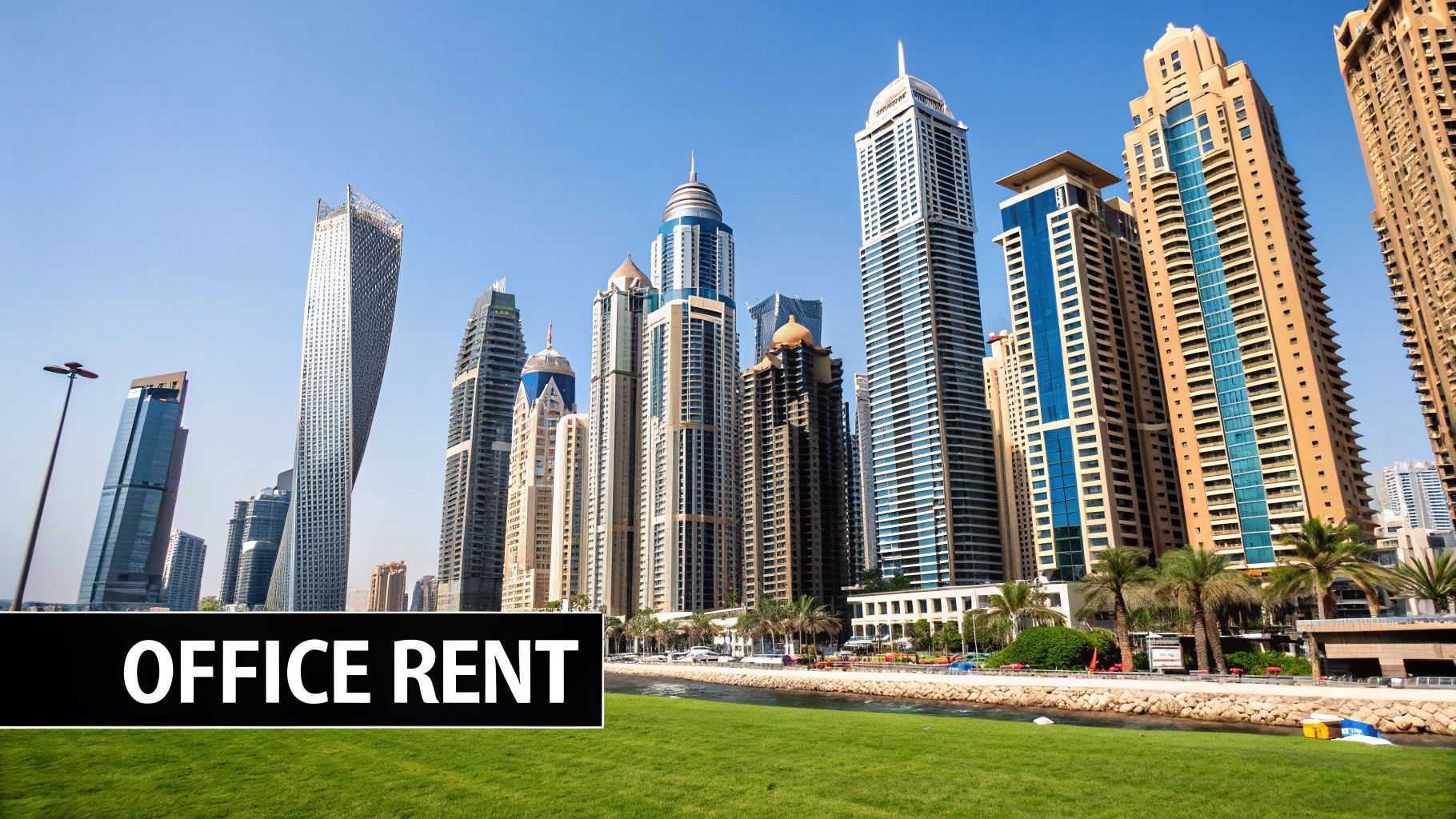
Navigating Office Rental Expenses
A physical address is a legal must-have for almost every business in Dubai. But the term "office space" can mean very different things with wildly different price tags, and your choice here will have a huge impact on your initial and ongoing business setup cost in Dubai.
For new entrepreneurs wanting maximum flexibility with minimal overhead, a flexi-desk is often the perfect solution, especially in free zones. It gives you a legitimate business address and access to shared workspace facilities without locking you into a long-term lease. It's an ideal starting point for solo founders and small teams.
As your business picks up steam, you might look into a serviced office. These are fully furnished, move-in-ready spaces that bundle services like reception, utilities, and IT support into one monthly fee. They’re pricier than a flexi-desk but offer a professional setup without the hassle of managing a traditional office. A traditional lease gives you the most control and space but is also the biggest financial commitment, as you’ll be managing rent, utilities, and furnishings all on your own.
A Breakdown of UAE Residence Visa Costs
For any foreign entrepreneur, getting a UAE residence visa for yourself, your partners, and your team is non-negotiable. Each visa comes with its own cost that you absolutely must factor into your budget. This isn't just a one-off fee; visas typically need renewing every two to three years, making it a recurring expense.
The process has several steps, and each has a government fee attached:
- Entry Permit: This is the first document needed for you or an employee to enter the UAE for work.
- Change of Status: You'll need this if the person is already in the UAE on another visa, like a tourist visa.
- Medical Fitness Test: A mandatory health check for all residence visa applicants.
- Emirates ID Application: The final step to get the official government ID card.
- Visa Stamping: The physical visa sticker that goes into the passport.
All in, the total cost for a single investor or employee visa usually lands somewhere between AED 4,000 and AED 7,000. The final figure can shift depending on whether you choose standard or express processing. For those looking at long-term residency, the UAE Golden Visa offers 5 or 10-year options, but that’s a different ball game with a separate application process and much higher investment requirements. To get a better handle on the details, check out our guide on the UAE investor visa requirements.
The Value of Corporate PRO Services
In the UAE, a Public Relations Officer, or PRO, isn't in marketing. A PRO is a specialist who acts as the critical go-between for your company and various government departments. They handle all the paperwork, applications, and clearances you need—from visa processing and licence renewals to labour contracts and immigration forms.
While you could technically try to manage these tasks yourself, the procedural complexity and language barriers can easily lead to expensive delays and frustrating mistakes. Investing in professional corporate PRO services is a smart strategic move, not just another cost.
Hiring a dedicated PRO services firm saves you an incredible amount of time, keeps you compliant with all regulations, and stops administrative nightmares from pulling you away from what you do best: running your business. It's an investment in efficiency and peace of mind, making it an essential line item in your operating budget.
When you look at the total business setup costs in Dubai, these recurring fees are a huge piece of the puzzle. Whether you're on the mainland or in a free zone, you'll face ongoing expenses for licensing, office space, and visas. For example, annual free zone licence fees can run anywhere from AED 10,000 to AED 50,000, while a mandatory office space can start around AED 15,000 to AED 20,000 for just a desk. If you don't budget for these repeating costs, you could seriously threaten your company's ability to operate. Beyond the startup phase, keeping a tight grip on operational expenses is key. It's worth exploring top strategies to reduce business expenses to make sure your financial plan is both realistic and sustainable for the long haul.
Partner with Experts for a Cost-Effective Launch
Figuring out the money side of a Dubai business launch can feel like navigating a maze. While this guide gives you a solid map, the final business setup cost in Dubai is always going to be unique to your specific dream and how you plan to run things. This is exactly where getting expert help shifts from being a nice-to-have to being your biggest advantage. Going it alone can easily lead to surprise costs and frustrating delays.
Working with specialists who live and breathe Mainland and Free Zone formations means you get a setup that's actually built for you. A seasoned consultant can take one look at your business model and point you to the most suitable and budget-friendly jurisdiction, potentially saving you thousands of dirhams right from the start.
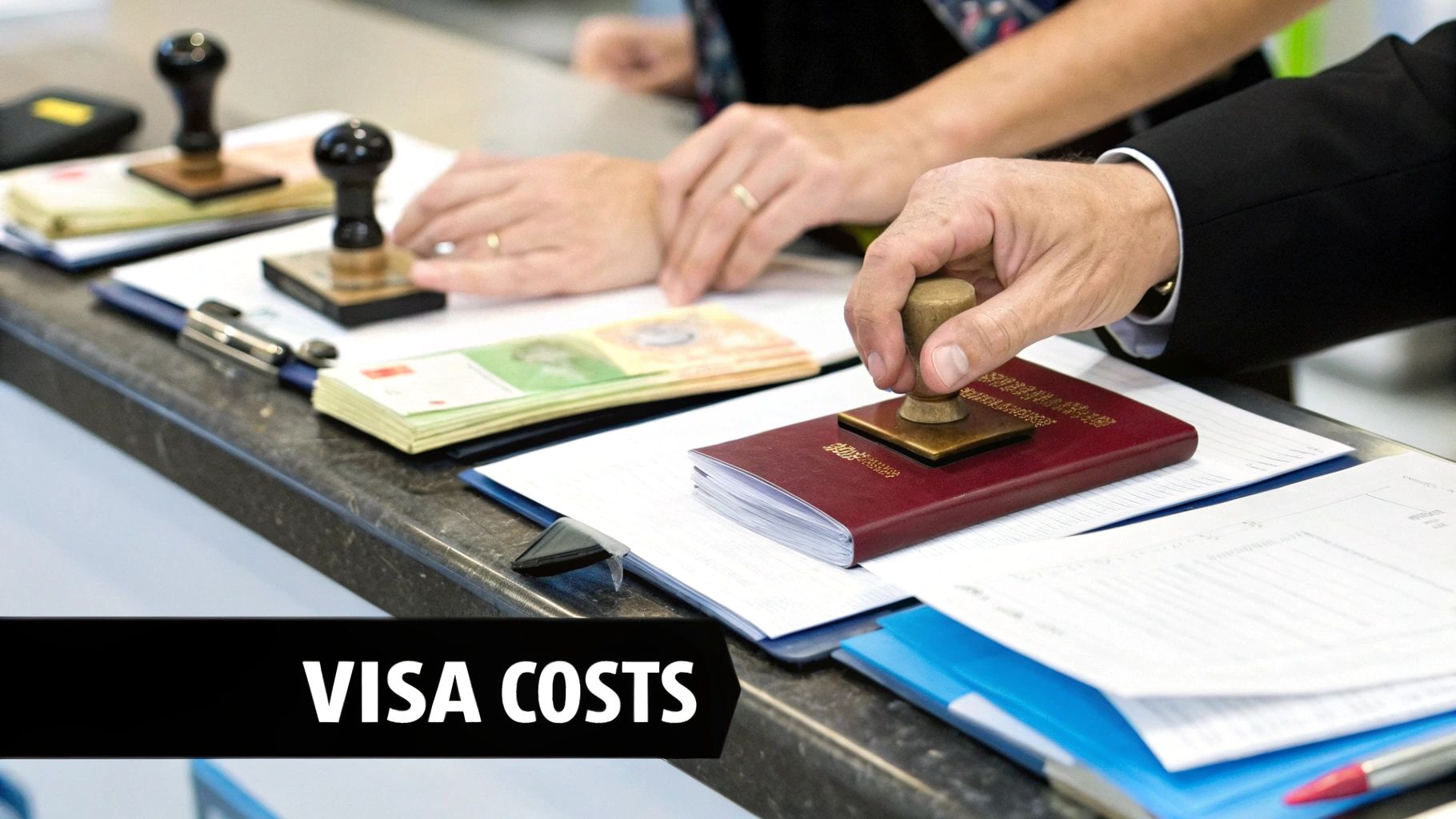
Tailored Solutions for Mainland and Free Zone Setups
Whether you're aiming for the local UAE market with a Mainland company or want the specific perks of a Free Zone, the right advice is priceless. Our team is deeply experienced in both, so we can give you the real story on the little details of each path.
- Mainland Company Formation: We are specialists in Mainland Company Formation in Dubai, Sharjah & Abu Dhabi. We walk clients through the exact requirements of the Department of Economic Development (DED), ensuring full compliance and a smooth process.
- Free Zone Company Formation: As specialists in Freezone Company Formation across the UAE, we leverage our connections to every major free zone. This lets us help you compare packages, visa allowances, and office options to find the absolute perfect home for your business.
This kind of dedicated support helps you sidestep common mistakes, like picking the wrong business activity or not budgeting enough for government fees.
Beyond the Licence: Comprehensive Support
A successful launch is about so much more than just getting a trade licence. It’s about putting all the pieces together—residency, legal paperwork, and staying compliant down the line. To get started on the right foot, it helps to implement proven cost reduction strategies for businesses from day one, ensuring every dirham is working for you.
Our comprehensive support covers the entire journey, helping you enjoy UAE tax benefits for international entrepreneurs:
- Investor and Golden Visa Services: We specialise in the Golden Visa on Property and Investor Visas, handling the whole application from eligibility checks to getting that final residency stamp in your passport.
- Corporate PRO and Attestation Services: Our team handles all government liaison, document submissions, and legalisation. This saves you valuable time and prevents expensive administrative headaches.
- Cost-Effective and Tailored Solutions: We focus on creating business setup solutions tailored to your specific needs, ensuring an affordable and efficient launch.
Choosing the right partner is an investment in a strategic advantage that gives you clarity and efficiency. With our 24/7 support service, we are always here when you need us, so you can focus on what really matters—growing your new business.
📞 Call Us Now: +971-54-4710034
💬 WhatsApp Us Today for a Free Consultation
Frequently Asked Questions
When you're looking at setting up a business in Dubai, the numbers can feel overwhelming. Let's break down some of the most common questions entrepreneurs ask about the real costs involved.
What Is the Absolute Minimum Cost to Start a Business in Dubai?
The rock-bottom cost to get a business off the ground in Dubai really depends on where you set up, but your most wallet-friendly options are almost always in specific free zones. Many offer startup packages that bundle in a flexi-desk and eligibility for one visa.
If you’re looking at a straightforward service licence in one of these free zones, you can expect to pay around AED 15,000 to AED 20,000 for your first year.
Now, it's crucial to know what that price tag actually covers. It typically includes your trade licence, company registration, and that flexi-desk facility. What it doesn't include are other essentials like your visa processing, the mandatory medical tests, your Emirates ID application, or any document attestation you might need. These can easily add several thousand dirhams to your final bill.
Mainland setups, on the other hand, are a different ball game. They almost always start at AED 30,000 or more because of stricter rules, like needing a physical office lease and a more detailed registration process.
Can I Set Up a Business in Dubai Without an Office Space?
The short answer is no, but you don't necessarily have to lease a traditional office. A physical address is a legal requirement for getting a trade licence pretty much anywhere in Dubai.
This is where free zones really shine. They offer smart, cost-effective ways to meet this legal requirement without breaking the bank. You can opt for a flexi-desk or a seat in a co-working space, which gives you a registered business address without the hefty overhead of a private office.
For mainland companies, the rules are much stricter. You'll almost certainly need a physical office lease registered through the Ejari system. The size and type of office you need will depend on your business activity and how many visas you're applying for. So, while you can't go without a registered address, you do have more affordable options than you might think.
Are There Any Hidden Fees I Should Be Aware Of?
While any good business setup consultant will give you a completely transparent, line-by-line quote, there are a few costs that often catch new entrepreneurs by surprise. Knowing about these ahead of time is key to budgeting properly.
Here are some of the costs that can pop up unexpectedly:
- Document Attestation Fees: If you're using documents from outside the UAE (like your degree certificate or company incorporation papers), they need to be legally attested. This comes with a fee.
- Translation Services: Any legal document not in Arabic will likely need an official translation, which is another expense.
- Establishment Card Fees: This is a non-negotiable card that registers your new company with the immigration authorities.
- Immigration E-Channel Registration: You'll need this to process visas online.
- Mandatory P.O. Box: Most jurisdictions require you to have a company P.O. Box, which has an annual fee.
On top of that, some business activities need special approvals from different government ministries, and each of those has its own fee. Don't forget the annual renewal costs for your trade licence, office space, and establishment card—these are significant recurring expenses to factor into your long-term plan.
This is exactly why working with an experienced business setup specialist is so valuable. They know where all these potential costs are hiding and can make sure your budget is solid from day one, so you don't get any nasty financial surprises.
How Much Does a UAE Investor Visa Cost?
For a standard UAE investor or partner visa, you should budget somewhere in the range of AED 4,000 to AED 7,000. That figure typically covers the whole process for one person, from start to finish.
This includes all the essential steps: getting the entry permit, changing your status if you're already in the UAE, the mandatory medical fitness test, the Emirates ID application, and finally, getting the visa stamped in your passport.
The final cost can vary a bit depending on whether you choose the normal or urgent processing service. It's also worth remembering that this isn't a one-time cost; the visa needs to be renewed every two or three years. The UAE Golden Visa is a different story, offering longer-term residency for five or ten years, but it has a different application process and higher costs, usually tied to a major investment. Our team can walk you through the specifics for both investor visas and the Golden Visa program.
Ready to make your business idea a reality without the financial guesswork? At PRO Deskk, we build clear, cost-effective business setup plans for entrepreneurs like you. We handle everything from the complexities of mainland and free zone setups to securing your investor visa, all with 24/7 support.
Contact PRO Deskk today for a free, no-obligation consultation and find the smartest path to launching your Dubai business.


